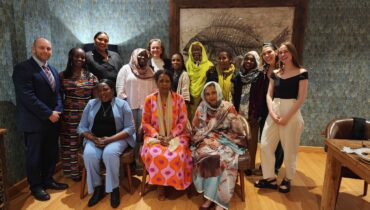Georgetown Institute for Women, Peace and Security Associate Director Mayesha Alam travelled to Amsterdam, Netherlands to participate in the “Women: Powerful Agents for Peace and Security” symposium, convened by the Ministry of Foreign Affairs of the Netherlands. Discussions at the symposium focused on enhancing the participation and leadership of women in conflict and post-conflict peacebuilding. Read her recap of the symposium below.
- We need to deconstruct what we mean by “peace” and “security” and reconstruct this terms, as well as how we formulate policy around them, in a way that incorporates the lived experiences of women and their grassroots level efforts. So when we say “peace” or “security”, what do we mean by this? Peace for whom and by whom? Security for whom and by whom?
As one woman leader from South Sudan, Rita Abraham, said, “The hierarchy of peace negotiations does not favour those who wage peace but those who wage war. Women are systematically marginalized from negotiations, even when mobilized for peace. It’s as if you need a gun to get to the peace table.”
What happens all too often, when the only people around a negotiation table are the warring parties, is that the discussion become about power-sharing and personal gain. This needs to be changed such that negotiations provide a roadmap for responsibility-sharing and good governance.
How do we do this? Listen to women on the ground. If they’re living it, they’re the true experts. They know what it takes to survive.
- Increase both the participation of women as well as their perspectives during peace negotiations. How do we do this? Make sure that every internationally mediated peace process includes one male mediator and one female mediator. And in the terms of reference for mediators, include guidelines and requirements related to gender sensitivity. These are two measures that can move us towards developing an international standard of practice.
- Civil society and government need to work more constructively together.CSO and government do not need to be friends but they do need to be able to partner.Peace is a multi-stakeholder process, but, too often, the participation of anyone that is not a direct warring party is simply cosmetic. One way to make the dialogue a partnership is by focusing on common goals and mutual interest.
- If you want women to be in decision-making positions, they need to be able to perform at their best and navigate the systems through which peace, governance and security are operated. This requires capacity-sharing (new terminology to replace capacity-building which connotes that women on the ground are lacking in capacity).
Two examples:
a) Electoral quotas — if you are going to create quotas for women to participate in formal politics, you need to make sure they are able to work the system and survive – to actually lead. Otherwise, quotas can be counterproductive.
b) Political parties — political parties in too many places have a bad reputation for their dysfunctional nature, for corruption and poor leadership, and for partisanship that ultimately undermines good governance. And yet, without political parties, there cannot be a true democratic system. Women often choose not to run for office because of the way political parties work. There is a need to overhaul and clean up parties. Democracy without women is impossible. And democracy without political parties is also not possible.
More than rights trainings or gender sensitization trainings, what women on the ground need are real entry points to engage directly in decision-making, whether or not they’re engaged informal politics.
- If you want to encourage governments to incorporate women into the process, don’t just blame and shame, but also use positive examples. How do we do this? Elevate those who are leading by example. Use positive examples to change mindsets; in every single country there are women who are doing important and transformative things. Highlight them and hold their governments accountable based on these positive examples rather than only negative examples.
- Violence takes many forms and one of the troubling trends now is gender-based violence and abuse being perpetrated through ICT. Maybe it seems like a lesser form of violence, but it can incite serious physical and mental harm, especially for women in politics or women human rights defenders. It feeds into institutions, it feeds in domestic violence within the home, and it can make very real barriers for women to participate that a) did not exist before or b) buttress old barriers.
- The WPS agenda needs to be broadened to include and engage with private security (not just police, armies and insurgent groups), especially as the role of private security companies grows in places like Afghanistan (UNSCR 1325 and subsequent resolutions do not recognize this actor). The same is true for the intelligence agencies. There is very little understanding and research on this topic. These agencies, especially in the Countering Violent Extremism space, have operated until now in a gender-blind way that actually does more harm than good and also undermines their objectives.
- Apply the principle of “Do No Harm”to the implementation of UNSCR 1325/the Women, Peace and Security Agenda. This is especially for donor agencies and governments who are increasingly trying to engage on these issues but don’t necessarily know how to. Even where good intentions exist, bad practice triumphs. A few common mistakes include:
- Not listening to women on the ground
- Speaking on behalf of women on the ground, rather than letting them speak for themselves
- Providing inadequate support to women’s groups due to the way in which international aid is administered or false perceptions (such as women’s groups are unable to manage financial resources, ill-equipped to handle large sums of money)


